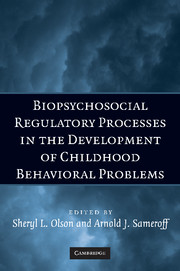Book contents
- Frontmatter
- Contents
- Preface
- Contributors
- 1 Conceptual Issues in Studying the Development of Self-Regulation
- 2 How Gene-Environment Interactions Can Influence the Development of Emotion Regulation in Rhesus Monkeys
- 3 Context Matters: Exploring Definitions of a Poorly Modulated Stress Response
- 4 An Integrative Approach to the Neurophysiology of Emotion Regulation: The Case of Social Withdrawal
- 5 Regulatory Competence and Early Disruptive Behavior Problems: The Role of Physiological Regulation
- 6 Behavior Regulation as a Product of Temperament and Environment
- 7 Self-Regulatory Processes in the Development of Disruptive Behavior Problems: The Preschool-to-School Transition
- 8 Emotional Dysregulation and the Development of Serious Misconduct
- 9 Regulatory Processes in Children's Coping with Exposure to Marital Conflict
- 10 Family Subsystems and Children's Self-Regulation
- 11 Culture and the Development of Regulatory Competence: Chinese–U.S. Comparisons
- 12 Self-Regulation and the Development of Behavioral and Emotional Problems: Toward an Integrative Conceptual and Translational Research Agenda
- Index
- References
7 - Self-Regulatory Processes in the Development of Disruptive Behavior Problems: The Preschool-to-School Transition
Published online by Cambridge University Press: 02 July 2009
- Frontmatter
- Contents
- Preface
- Contributors
- 1 Conceptual Issues in Studying the Development of Self-Regulation
- 2 How Gene-Environment Interactions Can Influence the Development of Emotion Regulation in Rhesus Monkeys
- 3 Context Matters: Exploring Definitions of a Poorly Modulated Stress Response
- 4 An Integrative Approach to the Neurophysiology of Emotion Regulation: The Case of Social Withdrawal
- 5 Regulatory Competence and Early Disruptive Behavior Problems: The Role of Physiological Regulation
- 6 Behavior Regulation as a Product of Temperament and Environment
- 7 Self-Regulatory Processes in the Development of Disruptive Behavior Problems: The Preschool-to-School Transition
- 8 Emotional Dysregulation and the Development of Serious Misconduct
- 9 Regulatory Processes in Children's Coping with Exposure to Marital Conflict
- 10 Family Subsystems and Children's Self-Regulation
- 11 Culture and the Development of Regulatory Competence: Chinese–U.S. Comparisons
- 12 Self-Regulation and the Development of Behavioral and Emotional Problems: Toward an Integrative Conceptual and Translational Research Agenda
- Index
- References
Summary
Failures in self-regulatory processes underlie the development of early-onset disruptive problem behavior. Two vignettes drawn from our research studies illustrate this connection. In the first, the setting is a preschool classroom:
A small group of boys and girls are playing with wooden blocks. The play is quiet and harmonious: two girls and a boy begin building a tower. Then another boy picks up a block and throws it forcefully across the room, nearly hitting his peers. “DON'T!” they shout. Ignoring their protests, he continues whipping blocks across the room, smiling to himself. His peers move to a far corner, leaving him alone. They continue to protest, and he continues to throw blocks. Finally, a girl picks up a block and throws it at his body. He returns fire before the conflict is stopped by a teacher.
The second setting is the home of a 3-year-old boy. During a research visit, his mother has been asked to encourage her child to put toys into a basket without doing it for him:
The mother's tone is warm and enthusiastic, “Come on, let's clean up. I'll help you!” The child stares straight ahead, as though he did not hear her. During the next 8 minutes, his mother continues to encourage him, trying to make the task into a game (“Do you want to count 'em when you put 'em away?”). He continues to ignore her. Now her face darkens and her voice tone becomes angry as she scolds him for “not following the rules.” He hits her with his fists, runs to his door, and tries to escape. His mother shouts “NO!” and he hits her again.
Information
- Type
- Chapter
- Information
- Biopsychosocial Regulatory Processes in the Development of Childhood Behavioral Problems , pp. 144 - 185Publisher: Cambridge University PressPrint publication year: 2009
References
Accessibility standard: Unknown
Why this information is here
This section outlines the accessibility features of this content - including support for screen readers, full keyboard navigation and high-contrast display options. This may not be relevant for you.Accessibility Information
- 24
- Cited by
